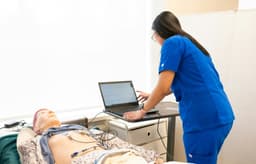Australia is one of the most popular destinations for international students aspiring to build a career in nursing. With high-quality education, globally recognized qualifications, and a strong healthcare system, studying nursing in Australia opens doors to rewarding career opportunities. This guide provides a step-by-step overview of the nursing admission requirements in Australia, helping you understand the application process and eligibility criteria.
1. Understand Nursing Programs in Australia
Before applying, it is essential to identify the right nursing program. Australia offers a range of programs to suit various backgrounds:
Diploma of Nursing Australia: An entry-level qualification that prepares students for practical nursing roles as Enrolled Nurses (EN).
Bachelor of Nursing Australia: The standard undergraduate program to become a Registered Nurse (RN), typically 3–4 years full-time.
Bachelor of Nursing Graduate Entry: For students who already hold a bachelor's degree in another field, an accelerated 2-year pathway.
Bachelor of Nursing Pre-Registration: A pathway ensuring graduates meet all requirements for RN registration.
Master of Nursing Australia: Advanced degree for specialization or for graduates seeking leadership roles in healthcare.
2. General Eligibility for Nursing in Australia
To apply for nursing in Australia, international students must meet certain academic and English language requirements. Key points include:
Completion of high school or equivalent for undergraduate programs (Diploma or Bachelor of Nursing).
Completion of a bachelor's degree in any field for graduate entry programs.
Minimum English proficiency scores via IELTS, TOEFL, or equivalent tests, as required by the institution.
A clear criminal background check, particularly for clinical placements.
3. Academic Requirements for Different Nursing Programs
The academic prerequisites vary based on the program level:
Diploma of Nursing High school completion with strong results in science and English. Some colleges may require prior experience in healthcare or community service.
Bachelor of Nursing Completion of high school with relevant subjects (biology, chemistry, or health sciences). GPA requirements may vary by university.
Graduate Entry Programs A completed undergraduate degree in any discipline. Some programs may prefer degrees related to health, science, or psychology.
Master of Nursing Bachelor's degree in Nursing (or equivalent) for postgraduate specialization. Relevant clinical experience may be required for advanced practice programs.
4. English Language Requirements
International students must demonstrate proficiency in English to succeed in nursing programs. Most universities and colleges require:
IELTS Academic: Overall 7.0 with a minimum of 7.0 in each band (may vary by institution)
TOEFL iBT: Overall 94–100
PTE Academic: Overall 65+
5. Health and Character Requirements
All nursing programs in Australia require students to meet health and character requirements due to the practical and patient-facing nature of the profession:
Health Screening: Immunizations, medical history, and possibly a physical exam.
Police Clearance: A clean criminal record to be eligible for clinical placements.
Working with Vulnerable People Check: Required in most states for students in healthcare settings.
6. Step-by-Step Nursing Application Process in Australia
Applying for nursing in Australia involves a structured process:
Step 1: Research Programs and Universities Identify universities or colleges offering Australian nursing courses that align with your career goals. Compare entry requirements, course duration, fees, and clinical placement opportunities.
Step 2: Prepare Academic Documents Gather high school or previous degree transcripts, graduation certificates, and reference letters. Ensure all documents are translated into English if necessary.
Step 3: Meet English Language Requirements Complete IELTS, TOEFL, or PTE tests and achieve required scores. Some universities may accept English as a medium of instruction in prior education.
Step 4: Submit Application Apply for a free consultation with us. Provide academic documents, English scores, CV, and personal statement if required.
Step 5: Receive Conditional Offer Universities issue conditional offers based on academic and English proficiency. Some offers may require additional documents such as health clearances or criminal checks.
Step 6: Accept the Offer and Apply for a Student Visa Accept the offer through the university portal. Apply for an Australian student visa (subclass 500) once the Confirmation of Enrolment (CoE) is issued.
Step 7: Prepare for Clinical Placement Arrange immunizations, health checks, and insurance as required. Prepare for practical training as part of your nursing course.
7. Additional Tips for International Students
Plan Early: Start researching programs at least 12 months in advance.
Choose the Right Pathway: Decide whether a Diploma, Bachelor's, Graduate Entry, or Master's suits your background.
Financial Planning: Consider tuition fees, living expenses, and scholarship opportunities.
Work Opportunities: Students can work part-time during study (up to 20 hours per week) and full-time during breaks.
Post-Study Work: Graduate work permits allow eligible international students to stay and gain work experience after completing their studies.
8. Career Opportunities After Studying Nursing in Australia
Once you meet all nursing entry requirements in Australia and graduate, you can work in:
Hospitals, clinics, and aged care facilities
Community health centers and NGOs
Specialized nursing units such as pediatrics, mental health, or critical care
Leadership, education, and research roles in healthcare
9. Conclusion
Studying nursing in Australia offers international students high-quality education, clinical experience, and a clear route to a rewarding healthcare career. Understanding the nursing application process, study requirements, and program options is essential for a successful journey. Whether you choose a diploma, bachelor's, or graduate-entry program, Australia provides world-class facilities, experienced faculty, and global career opportunities for aspiring nurses.









